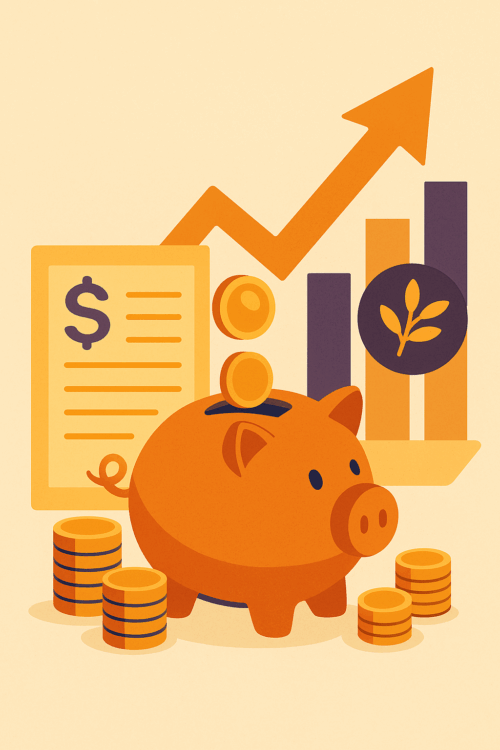Big changes are coming to superannuation from July 2025. The most important change is that employers must now pay 12% into your super instead of 11.5%. This completes a long series of increases that started years ago.
These changes will affect your take-home pay and could impact your ability to borrow money for a home. Here’s what you need to know and how to prepare.
What’s Changing in July 2025
Super Guarantee Goes Up to 12%
What happens: Your employer must put 12% of your pay into super from July 2025. This is up from 11.5% now.
Real example: If you earn $70,000 per year, an extra $350 will go into your super account. That’s money that won’t be in your pay packet anymore.
The trap: The limit for pre-tax super contributions stays at $30,000 per year. If you already put extra money into super through salary sacrifice, you might go over this limit and face tax penalties.
More Money Allowed in Retirement Super
What happens: Retirees can now hold $2 million in tax-free super (up from $1.9 million).
Why it matters: For couples, this means an extra $200,000 can earn tax-free income. At 5% returns, that’s $10,000 extra per year with no tax.
Who benefits: People with large super balances who want to move more money into the tax-free retirement phase.
Government Co-contribution Changes
What happens: More people can now get up to $500 from the government when they put their own money into super.
New rules: You can get the full $500 if you earn up to $47,488 per year. The benefit cuts out completely at $62,488.
How it works: For every $1 you put in (up to $1,000), the government adds 50 cents.
Contribution Limits Stay the Same
No change: You can still put up to $30,000 of pre-tax money into super each year. After-tax contributions are capped at $120,000.
Important note: High earners (over $250,000) still pay extra tax on super contributions.
How These Changes Affect Property Buyers
Less Take-Home Pay
The 0.5% super increase means less money in your pay packet each week. For a couple both earning $80,000, this means about $65 less per month to spend.
For new home buyers: Banks might lend you less money because your take-home pay is lower. This could reduce your borrowing power by $10,000 to $15,000.
For current homeowners: Check your budget to make sure you can still afford your mortgage payments.
More Options for Retirees
The higher super limits create new opportunities for people near retirement:
- Pay off investment property loans faster
- Fund home improvements
- Help adult children buy property
- Downsize without immediate tax problems
Four Steps to Prepare
1. Check Your Super Contributions
Add up all the money going into your super:
- Your employer’s contributions (now 12%)
- Any extra you put in through salary sacrifice
- Personal contributions you make
Make sure the total stays under $30,000 per year. If it doesn’t, you’ll pay penalty tax.
2. Review Your Budget
Calculate how much less take-home pay you’ll have:
- Multiply your annual salary by 0.5%
- Divide by 52 to get the weekly reduction
- Check if this affects your ability to pay bills or save for a house deposit
3. Claim Government Money
If you earn between $37,000 and $62,488:
- Put up to $1,000 of your own money into super before June 30
- The government will add up to $500
- This is a guaranteed 50% return on your money
4. Plan for Retirement
If you’re over 55:
- Consider starting a pension with your super money
- Take advantage of the higher $2 million limit
- Speak to a financial adviser about restructuring your super
What This Means Long-Term
While you’ll have less spending money now, the extra super contributions will grow over time. A 30-year-old could have an extra $50,000 to $80,000 when they retire because of this 0.5% increase.
The government designed these changes to help Australians save more for retirement. This reduces the number of people who will need the age pension in future.
Why These Changes Matter Now
These super changes happen during a time when:
- Interest rates are high
- Everything costs more due to inflation
- Many families are already struggling with money
The timing makes it extra important to plan ahead and adjust your budget.
Common Questions
Q: Can I opt out of the super increase? A: No, all employers must pay 12% super for eligible workers.
Q: What if I go over the $30,000 contribution limit? A: You’ll pay extra tax on the excess amount. It’s better to reduce your salary sacrifice to stay under the limit.
Q: Should I put less into super now? A: It depends on your situation. The extra 0.5% from your employer is free money that grows tax-free. But you might need to reduce voluntary contributions.
How Sanford Finance Can Help
We understand how super changes affect your ability to borrow money. Our team can help you:
First home buyers: We’ll show you how the super increase affects your borrowing power and help you plan your deposit savings.
Property investors: We’ll help you understand how super changes interact with your investment strategy.
Pre-retirees: We work with your financial planner to make sure your property and super strategies work together.
Current borrowers: We’ll review how the changes affect your current loans and future borrowing plans.
Our advisers stay up-to-date with all the latest rules and can guide you through the changes that affect your specific situation.
Take Action Now
Don’t wait until July to prepare for these changes. Start planning now to:
- Avoid going over contribution limits
- Keep your mortgage affordable
- Take advantage of government incentives
- Maximize your retirement savings
The earlier you plan, the better positioned you’ll be when the changes take effect.
Important: This information is general advice only. Super and tax rules are complex and change often. You should get personal financial and tax advice before making decisions. This article is current as of August 2025 and rules may change.




